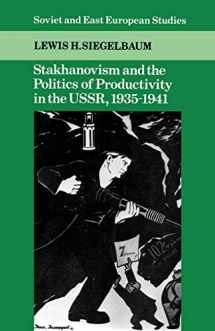
Stakhanovism and the Politics of Productivity in the USSR, 1935–1941 (Cambridge Russian, Soviet and Post-Soviet Studies, Series Number 59)
Book details
Summary
Description
This is the first study in English of a major and instructive episode in the history of the Soviet Union. The Stakhanovite movement commemorated the mining of 108 tons of coal by Alexi Stakhanov in 1935 and it was an important symbol by which the state urged workers to achieve greater productivity. As Siegelbaum shows, Stakhanovism can be used to explore the social relations within Soviet industry at a critical stage in its development. In this sense, Stakhanovism was an important symbol of a shift in official priorities from construction of the means of production via increasing inputs of labor to intensive use of capital and labor.


We would LOVE it if you could help us and other readers by reviewing the book
Book review



